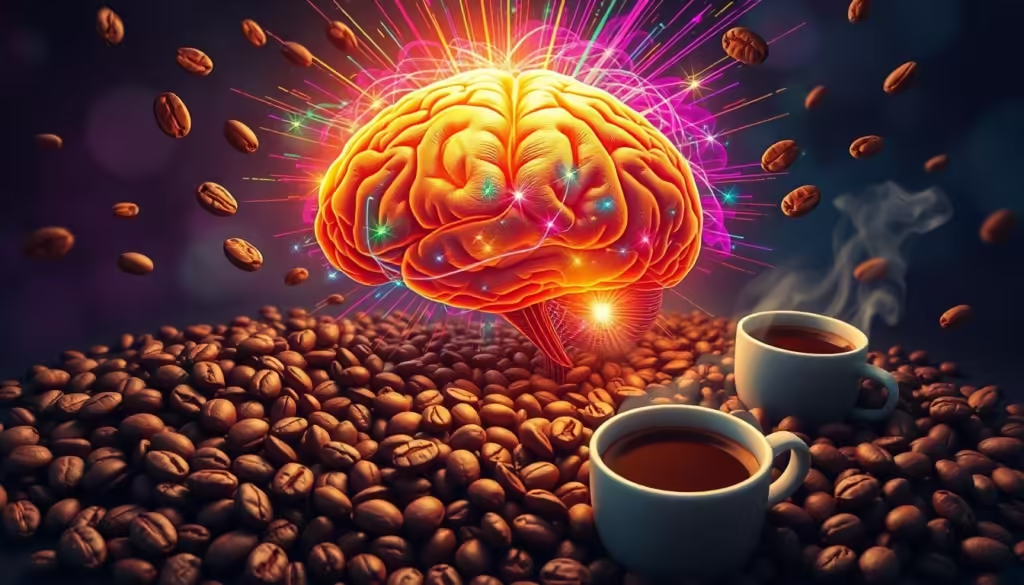
Four out of five adults in the United States drink caffeine every day. It’s a key stimulant that can change how you feel and even affect your heart and pregnancy. Knowing about caffeine is key to using it wisely and staying healthy.
Caffeine is found in over 60 plants, like coffee beans and tea leaves. It’s in many drinks, from coffee and tea to energy drinks and some sodas. The caffeine in these can vary a lot, with tea having 14 to 60 milligrams and coffee up to 200 milligrams per cup.
It’s important to know how caffeine affects you and any health risks. This article will cover caffeine’s effects on your brain, heart, and digestion. It also talks about special concerns for pregnant people and those with bone health issues.
Table of Contents
Understanding Caffeine: A Stimulant Extraordinaire

Caffeine is a substance that has caught the eye of many. It’s studied by scientists and loved by many. But what is it, and where does it come from? Let’s explore the world of this popular stimulant.
What is Caffeine?
Caffeine is found in plants like coffee beans, tea leaves, and cocoa beans. It’s a stimulant that makes our brain and body more active. It’s tasteless and odorless but has big effects on us.
Sources of Caffeine
Caffeine is found in coffee, tea, energy drinks, sodas, chocolate, and some medicines. The amount in these products varies. Tea has 14-60 mg, while coffee has up to 200 mg per cup. Energy drinks can have even more, up to 300 mg.
Here’s a quick look at caffeine levels in different drinks:
| Beverage | Caffeine Content (8 oz serving) |
|---|---|
| Coffee | 95 mg |
| Black Tea | 47 mg |
| Green Tea | 28 mg |
| Energy Drink | Up to 300 mg |
| Soda | 30-55 mg |
| Chocolate (dark) | 24 mg |
Knowing where caffeine comes from and how much is in it is key. It helps us manage how it affects us. Next, we’ll look at its benefits and possible downsides.
The Brain-Boosting Effects of Caffeine

Caffeine is known for making us feel more alert and focused. It works by blocking a brain chemical that makes us tired. This can make us react faster in tasks that require quick decisions.
But caffeine does more than just wake us up. It can also make us feel better and improve our memory and learning skills. However, too much caffeine can make us feel anxious and tense.
Increased Alertness and Focus
Caffeine is a strong stimulant that keeps us awake and sharp. It can delay when we fall asleep and make us feel more alert during the day. Even a small amount can help us stay alert, no matter how tired we are.
Potential Cognitive Benefits
Research shows that caffeine might have cognitive benefits. Drinking coffee regularly could lower the risk of memory loss and diseases like Alzheimer’s and Parkinson’s. Drinking 3 cups of coffee a day might even reduce the risk of Parkinson’s by 29%.
While we need more studies, it seems that caffeine can improve our mood and mental sharpness. But drinking it too close to bedtime can mess up our sleep and hurt our brain function.
Caffeine and Sleep: A Double-Edged Sword

Caffeine, found in coffee, tea, and energy drinks, has both good and bad effects on sleep. It can give you a much-needed energy boost. But, it can also mess with your sleep patterns, causing insomnia and other sleep problems.
Caffeine blocks adenosine, a brain chemical that helps control your sleep-wake cycle. Drinking caffeine, especially in the afternoon or evening, makes it harder to fall and stay asleep. This can lead to a restless night and make you feel tired the next day.
- Caffeine can delay sleep and reduce sleep quality, causing insomnia and other sleep issues.
- The effects of caffeine last for hours, so it’s key to watch your intake, especially before bed.
- Drinking caffeine close to bedtime can mess with your circadian rhythms, which control your sleep-wake cycle.
To get good sleep, it’s important to watch your caffeine intake, especially in the afternoon and evening. Finding the right balance lets you enjoy caffeine’s benefits without harming your sleep or well-being.
“Caffeine is a double-edged sword when it comes to sleep. While it can provide a much-needed energy boost, it can also disrupt your sleep patterns, leading to insomnia and other sleep-related issues.”
Remember, finding the right balance and being mindful of caffeine intake, especially before bed, is key. This way, you can enjoy caffeine’s benefits while getting a good night’s sleep.
Caffeine’s Impact on Mental Well-Being

Caffeine, found in coffee, tea, and more, affects our mental health. It can make us feel better at first, but too much can cause anxiety and addiction.
Mood Enhancement
Caffeine boosts mood by affecting dopamine, a pleasure hormone. Research shows that up to 400 milligrams a day can make us feel happier and more engaged.
Anxiety and Addiction Risks
But, caffeine’s effects on mental health are complex. Too much, especially in energy drinks, can increase anxiety. It can also lead to addiction and withdrawal, harming our mental state.
It’s vital to know how much caffeine you can handle, especially if you have mental health issues. Finding the right balance is crucial for our mental well-being.
“Caffeine can have both positive and negative effects on mental health, and it’s crucial to be aware of your individual tolerance levels and potential risks.”
The Cardiovascular Effects of Caffeine
Caffeine is a stimulant found in many drinks. It can briefly raise blood pressure and heart rate in people who are resting. For most healthy adults, this is not a problem. But, those with heart issues or high blood pressure should be careful with caffeine.
Blood Pressure and Heart Rate
Caffeine blocks adenosine receptors, which increases blood pressure and heart rate. Studies show that 300 mg of caffeine can raise systolic blood pressure by 7 mm and diastolic by 3 mm.
Caffeine also affects heart rate. A study found that caffeine before exercise lowers blood flow to the heart by 14%. Another study showed a 22% decrease in blood flow after 200 mg of caffeine and exercise.
| Cardiovascular Effect | Caffeine Dose | Outcome |
|---|---|---|
| Decreased endothelial cell function | Energy drinks | Decreased endothelial cell function in individuals at rest |
| Increased flow-mediated dilatation | 200 mg | Increased flow-mediated dilatation of the brachial artery by 10% |
| Increased resting forearm blood flow response | 300 mg | Increased resting forearm blood flow response to acetylcholine by 25% |
| Reduced exercise-induced myocardial blood flow response | Caffeine ingestion followed by exercise | Reduced exercise-induced myocardial blood flow response by 14% |
| Reduced exercise-induced myocardial blood flow response | 200 mg of pure caffeine and then exercise | Decreased the exercise-induced myocardial blood flow response by 22% |
Remember, caffeine’s effects on the heart can differ for everyone. Always talk to a doctor about caffeine, especially if you have health issues.
Caffeine and Your Digestive System
Caffeine can give you a much-needed energy boost. But, it can also have some unwanted effects on your digestive system. Knowing about these issues can help you manage your caffeine intake and keep your gut healthy.
Acid Reflux and Heartburn
Caffeine can make your stomach produce more acid. This can cause acid reflux and heartburn, especially for those with GERD. If you have a sensitive stomach, watch how much caffeine you drink to avoid these problems.
Dehydration and Frequent Urination
Caffeine acts as a diuretic, making you urinate more. This can lead to dehydration if you don’t drink enough water. It can upset the balance of fluids and electrolytes in your body, causing more digestive issues.
To keep your digestive system healthy, be careful with your caffeine intake and drink plenty of water. If you have ongoing digestive problems, talk to your doctor. They can help you find a plan that fits your needs.
| Caffeine Effects | Impact on Digestion |
|---|---|
| Increased stomach acid production | Acid reflux and heartburn |
| Diuretic properties | Dehydration and frequent urination |
Everyone reacts differently to caffeine. So, it’s key to listen to how your body responds. By understanding caffeine’s effects on digestion, you can make choices that support your gut health and overall well-being.
Caffeine During Pregnancy: Proceed with Caution
When you’re expecting, your choices matter a lot. This is especially true for caffeine. It can pass through the placenta and affect your baby’s growth. So, it’s important to be careful with caffeine during pregnancy.
The Mayo Clinic says to limit caffeine to 200-300 milligrams a day. This is about 2-3 cups of coffee or 4-5 cups of tea. Too much caffeine can increase the risk of miscarriage and slow down your baby’s growth.
Caffeine levels vary in different drinks. For example, a single mug of coffee can have up to 140 milligrams. Energy drinks can have up to 80 milligrams. Pregnant women should read labels and talk to their doctors to find a safe amount.
| Caffeine Source | Caffeine Content (mg) |
|---|---|
| 1 soft drink can | 40 |
| 1 mug of tea | 75 |
| 1 250 ml can of an energy drink | up to 80 |
| 1 mug of instant coffee | 100 |
| 1 mug of filtered coffee | 140 |
| Chocolate | 31 |
| 1 mug of decaffeinated coffee | 12 |
| 1 mug of hot chocolate | 9 |
Studies on caffeine and pregnancy are ongoing. But, they show caffeine doesn’t affect a baby’s sleep in the first three months. However, too much caffeine while breastfeeding can make a baby fussy and sleep poorly.
The link between caffeine and fetal development is complex. Pregnant women should talk to their doctors to find a safe caffeine level for them and their baby.
Caffeine and Bone Health: A Potential Concern
Caffeine is a popular stimulant, but its impact on bone health is debated. Studies suggest a link between caffeine and higher fracture risk in women. However, other studies disagree with these findings.
Too much caffeine might cause problems like insomnia and fast heartbeat. It can also lead to losing calcium in urine and lower bone density. This could harm bone health.
But, research shows that up to 400 mg of caffeine a day is usually safe for healthy adults. It might even help with bone health, but it could also increase the risk of osteoporosis.
Studies in labs show caffeine can slow down bone growth and affect bone mineralization. This means the effect of caffeine on bones is complex. It depends on how much you drink.
| Statistic | Value |
|---|---|
| Estimated Americans with osteoporosis or bone loss by 2030 | More than 70 million |
| Annual cost of osteoporosis-related fractures in the US | $17.9 billion |
| Daily coffee consumption by US adults | 64% |
| Daily cups of coffee consumed in the US | 517 million |
The study on caffeine effects and bone health is ongoing. It’s key for people to be aware of their caffeine and osteoporosis risks. Eating a balanced diet with enough calcium and vitamin D is crucial for bone health.
Caffeinated Energy Drinks: A Unique Risk
In recent years, caffeinated energy drinks have become very popular. They sold $57 billion worth globally in 2020. These drinks, with lots of caffeine, might be riskier than other caffeinated drinks.
Energy drinks have a lot of caffeine. Some have up to 505 milligrams per can or bottle. This is more than a medium coffee from Dunkin’ Donuts or a 12-ounce Red Bull.
Drinking a 32-ounce energy drink can make your heart rate and blood pressure go up. It also increases the chance of abnormal heart rhythms. This is because of the caffeine and other stimulants in energy drinks.
- Energy drinks are the second most popular dietary supplement among US teens and young adults, following multivitamins.
- The American Academy of Child and Adolescent Psychiatry recommends children under 12 avoid caffeinated beverages, and adolescents limit intake to less than 100 milligrams of caffeine per day.
- Pregnant and breastfeeding women are advised to limit caffeine consumption to less than 200 milligrams per day.
People, especially those with heart problems, should be careful with energy drinks. The caffeine and other stimulants in these drinks can be risky for health.
“The FDA was asked to investigate Logan Paul’s energy drink, PRIME, which equates to the caffeine content of six cans of Coke.”
The Dangers of Mixing Caffeine and Alcohol
Drinking caffeine with alcohol is very dangerous. The caffeine can hide the effects of alcohol, leading to risky behavior. This can cause injuries or other bad outcomes.
Energy drinks also have a lot of sugar. This can lead to health problems like diabetes and heart disease. It’s important to drink these beverages in moderation.
What Is a Safe Caffeine Intake?
Caffeine is found in many drinks and foods, like coffee and energy drinks. It can make you feel more alert and focused. But, it’s crucial to know how much is safe to avoid too much.
Recommended Daily Limits
The FDA says healthy adults can safely have up to 400 milligrams (mg) of caffeine daily. This is about the amount in 4 cups of coffee. But, the caffeine in drinks can differ a lot. For example, a caffeinated soda has 23 to 83 mg, and energy drinks have 41 to 246 mg per 16-ounce serving.
Individual Variations
While 400 mg is a general rule, how much caffeine you can handle varies. Some people might need to stick to less than 400 mg a day. Your age, weight, and health can affect how caffeine affects you. It’s key to know how caffeine impacts you and adjust your intake.
| Beverage Type | Caffeine Content (per 8 oz) |
|---|---|
| Coffee | 95-200 mg |
| Tea | 47-90 mg |
| Soda | 23-55 mg |
| Energy Drinks | 54-160 mg |
Always talk to a doctor if you’re worried about caffeine or notice any bad effects. Knowing the safe amounts and your own limits helps you enjoy caffeine safely. This way, you can stay healthy and feel good.
“Moderation is key when it comes to caffeine consumption. Knowing your personal limits and listening to your body’s signals can help you find the right balance.”
Caffeine Withdrawal: The Flip Side of Consumption
Caffeine is popular for its energy boost and brain power. But, it can also lead to addiction and withdrawal. It’s the most used psychoactive substance worldwide, especially in North America.
Anyone who drinks caffeine regularly can face withdrawal. Symptoms start 12 to 24 hours after stopping and can last up to 9 days. They include headaches, tiredness, and mood swings.
Caffeine withdrawal can happen after just three days. It gets worse with longer use. Caffeine stays in the body for up to 5 hours, with effects felt in 30-60 minutes.
Withdrawal can show you’re addicted to caffeine. It’s hard to stop. But, slowly cutting down can ease symptoms. For serious addiction, getting help is key.
Knowing about caffeine withdrawal helps manage caffeine use. Recognizing symptoms lets people plan to reduce withdrawal. This way, they can control caffeine use healthily.
Conclusion
Caffeine is a popular stimulant with both good and bad effects on our bodies. It can boost our mood and brain function but also harm our heart and stomach. Knowing how caffeine affects us is key to using it wisely and staying healthy.
Being aware of how much caffeine you can handle is important. This is especially true for pregnant women and others with special needs. The FDA suggests not to have more than 400 mg of caffeine daily, which is like drinking two to three cups of coffee.
As you explore caffeine’s effects, listen to your body and adjust your intake. This way, you can enjoy caffeine’s benefits without the risks. It helps you live a healthier, more energetic life.
